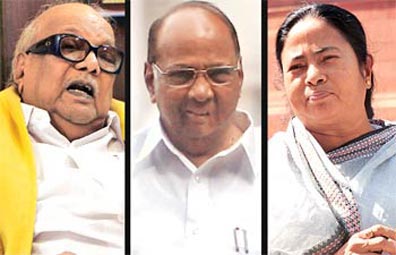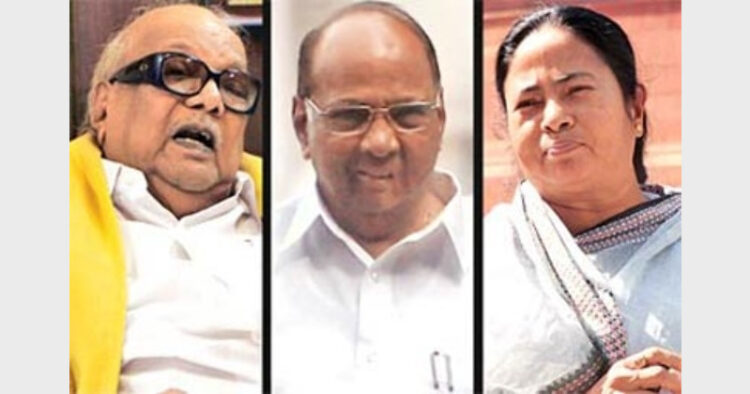Congress blunders annoy allies; BJP upbeat?
By GVL Narasimha Rao?
 The UPA in its second edition after 2009 polls has only a few allies namely, the Trinamul Congress, DMK, NCP, National Conference etc. At present, the Congress Party’s relations with all of them are severely strained and a separation can lead to an accidental election. Spiralling inflation, a spate of scams and a loss of public esteem are making the Congress Party increasingly an electoral liability for its allies as evident from its recent by-election defeats all over the country.
The UPA in its second edition after 2009 polls has only a few allies namely, the Trinamul Congress, DMK, NCP, National Conference etc. At present, the Congress Party’s relations with all of them are severely strained and a separation can lead to an accidental election. Spiralling inflation, a spate of scams and a loss of public esteem are making the Congress Party increasingly an electoral liability for its allies as evident from its recent by-election defeats all over the country.
Further, the Congress Party’s attempts to hold its allies responsible for the central government’s marked failings – NCP for price rise, DMK for corruption – have made them chary of its intentions. Through these dubious attempts, the Congress Party has come across as an unreliable ally violating ‘Coalition Dharma” at will. That this has stoked fears among Congress’ allies is evident from their recent actions and utterances.
Mamata Banerjee led Trinamul Congress with 18 MPs in Lok Sabha had threatened to pullout from the central government in protest against the petrol price hike earlier this month. The Congress brass reversed the hike within a few days to mollify Mamata Banerjee. With a comfortable majority of her own in the state assembly, Mamata does not need the Congress Party to run her government in West Bengal. Mercurial Mamata has brought the Congress to its knees and will keep it on tenterhooks in the months ahead.
DMK leader M Karunanidhi, whose party also has 18 MPs in Lok Sabha, is extremely angry with the Congress leadership and holds it responsible for the continued incarceration of his daughter Kanimozhi, A Raja and others even as he believes that the Congress Party has pulled out all the stops to prevent P Chidambaram from being investigated in the 2G scam probe. A wounded and wily Karunanidhi is biding his time to strike at the Congress at an opportune time.
Nationalist Congress Party’s Supremo Sharad Pawar is panicky after his party’s defeat in the last month’s by-election to Khadakwasla assembly constituency that falls in his family’s pocket borough Baramati parliamentary constituency represented by Pawar’s daughter Supriya Sule. NCP has quickly realised that the party has no future in an alliance with the Congress and has begun exploring other potential alliance partners in Maharashtra.
Even the Congress-National Conference relations have soured recently. The public sparring between the Chief Minister of Jammu & Kashmir Omar Abdullah and the Congress led central government over his plans to withdraw the Armed Forces Special Powers Act (AFPSA) Act from parts of the state has led to a confrontation between the alliance partners. The differences are still summering and a stand off may be in the offing.
The Congress Party’s relations with its allies are so fragile that even a minor trigger can cause an alliance rupture. Even if they keep the UPA government afloat for some more time for their own selfish reasons, come next parliamentary elections, they are bound to migrate to other alliances to brighten their electoral prospects. Even if some of them choose to keep the alliance with the Congress Party intact, the terms of engagement would heavily favour them vis-à-vis a weakened Congress Party.
Temperamentally, Congress is not a party that can work with coalitions. After the grand Panchmarhi declaration of 1998, electoral compulsions forced it to form a coalition government at the Centre in 2004. The Congress can work in a coalition only as long as someone other than a Nehru-Gandhi family member is heading the government. If Rahul Gandhi eventually decides to run for the office of Prime Minister, as all signals from that party suggest, Nehru-Gandhi dynasty’s bloated ego would not allow it to run a coalition government. He would prefer a single party majority for the Congress – a plan that would be detested by all present and potential Congress allies. But given the present mess that the Congress led UPA government finds itself in, it can barely hope to retain half of its present strength in Parliament in the 16th Lok Sabha.
The weakening of the UPA opens up expansion opportunities for the BJP led National Democratic Alliance (NDA). Getting more allies on to its side may inch the BJP closer to power at the Centre but a government would remain stable only if the BJP has a sizeable strength of its own, of say at least 180 seats. Heading a government in which even the smallest allies can resort to blackmail politics would hardly be a desirable situation after having stayed out of office for 10 years.
The present situation affords a great opportunity to the BJP to enhance its strength in the next parliamentary elections to well beyond 180 seats. This opportunity emanates from the desire of a sizeable voter population that wants a responsible and idealism and governance driven national party to rule the country. This sentiment is particularly strong in urban areas and among the youth and middle classes. As the BJP held out a great promise, these sections rooted for the BJP in the 1990s and catapulted it to a national party of governance. The same sections migrated to the Congress in the last two parliamentary elections and handed it power at the Centre. These are “swing groups” which switch votes from one party to the other based on their performance and promise and cause many election wins and upsets.
Today, these swing groups are disillusioned with the Congress Party and its central government due to unbridled corruption and unabated inflation. These are also the sections that have lent tremendous support to the civil society movements against corruption. For sure, these sections have decisively turned anti-Congress but have not yet returned to the BJP. The negative publicity attracted by the BJP in the media on account of various follies and the general anti-politician mood are delaying this process of return. To become a favoured party of these sections once again, the BJP needs to show exemplary conduct and extraordinary performance in states ruled by the party. It must demonstrate vision and project leadership that can convince masses that the party is not merely seeking power but has a credible governance agenda. As the Congress Party vacates the national centre stage, India beckons the BJP to steer its governance that has strayed course under the UPA’s stewardship. The BJP had utilised every such opportunity in the past to emerge stronger and the present one should be no exception.
(The writer is a noted poll analyst and a Member of BJP’s National Electoral Reforms Committee)













Comments